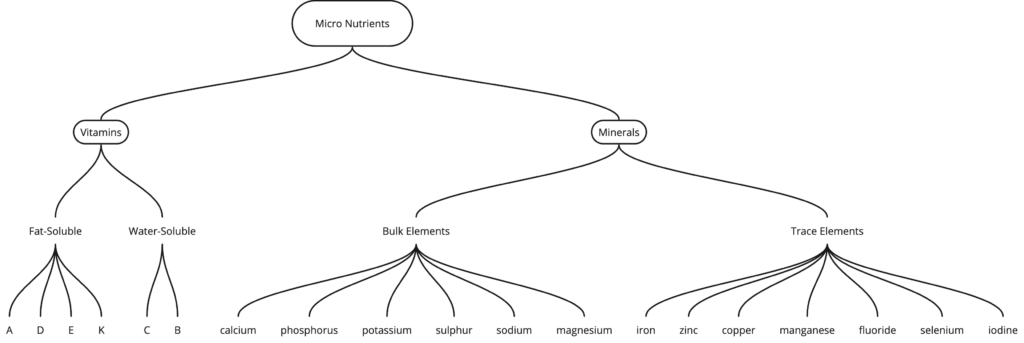
The variety of nutrients is enormous, and each one plays a unique role in the body. A balanced diet that contains all macro- and micronutrients in adequate amounts is crucial for health, well-being and disease prevention. A well-balanced diet, combined with a healthy lifestyle, on the other hand, helps to promote health and lead a fulfilling life.
It is therefore important to make conscious nutritional choices and ensure that the body receives all the nutrients it needs. To ensure this, it is essential to have an overview of the range of topics. This is what I will try to achieve in this blog post, before going into more detail on the individual categories in the following posts.
Macro Nutrients
Macronutrients are what most people think of first when they hear the term „nutrients“. If we consume them in sufficient quantities, we normally also have our micronutrients adequately covered.
Compared to vitamins and minerals, we consume relatively large quantities of macronutrients. They include proteins, carbohydrates and fats and provide us with the energy we need to live.
Macro nutrients are the building blocks in our diet that our body needs to produce energy. Compared to vitamins or minerals, for example, we therefore consume them in relatively large quantities. The most important macronutrients include carbohydrates, proteins and fats.
It is important to note that carbohydrates must be considered separately. Proteins and fats are considered essential macros. This means that they should always be integrated into a diet under all circumstances, as our body cannot produce these nutrients itself, but must be supplied in the form of food, whereas carbohydrates can be produced by the body itself if necessary by converting fats or proteins in order to provide energy.
If we take a closer look at energy production, we can say that we can obtain different amounts of energy from one gram of a given macronutrient. To be more precise
1g protein 4 kcal, or 16 kJ
1g carbohydrates 4 kcal, or 16 kJ
1g fat 9 kcal, or 36 kJ
Whether digestion, cell division or respiration: carbohydrates, fats and proteins together form the basis of all metabolic processes and also fulfill very different functions in our body.

1. Carbohydrates: the main source of energy
- Simple sugars (monosaccharides): Glucose, fructose, galactose.
- Disaccharides (disaccharides): Sucrose, lactose, maltose.
- Multiple sugars (polysaccharides): Starch, glycogen, dietary fiber.
The main function of carbohydrates is to provide energy, especially for the brain and muscles.
2. Proteine: Bausteine des Lebens
- Essential amino acids: Those that the body cannot produce itself and must be taken in through the diet.
- Non-essential amino acids: Those that the body can produce itself.
Proteins are essential for building and repairing tissues, producing enzymes and hormones and supporting the immune system.
3. Fats: Energy and More
- Saturated fats: Mainly found in animal products.
- Unsaturated fats: Contain monounsaturated and polyunsaturated fatty acids. Health-promoting fats found in fish, nuts and vegetable oils.
- Trans fats: Artificially produced fats that should be avoided.
Fats serve as a long-term source of energy, protect organs, regulate hormone balance and are important for the absorption of fat-soluble vitamins.
Micro Nutrients

1. Vitamins: Regulators of the metabolism
- Fat-soluble vitamins: A, D, E, K.
- Water-soluble vitamins: C, B-complex (B1, B2, B3, B5, B6, B7, B9, B12).
Vitamins play a key role in various metabolic processes, the protection against diseases and the maintenance of skin, eyes, bones and much more.
2. minerals: building blocks and regulators
- Bulk elements: calcium, phosphorus, potassium, sulphur, sodium, magnesium.
- Trace elements: iron, zinc, copper, manganese, fluoride, selenium, iodine.
Minerals are involved in the formation of bones and teeth, regulate the water balance, support oxygen transport and are components of enzymes.